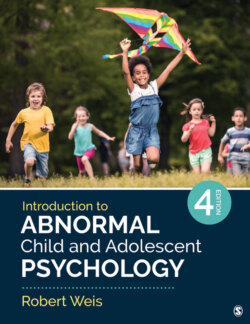Читать книгу Introduction to Abnormal Child and Adolescent Psychology - Robert Weis - Страница 119
На сайте Литреса книга снята с продажи.
Principle 4: Precision
ОглавлениеThe principle of precision means that scientists are careful in the way they collect data and the conclusions that they draw from their observations. In everyday life, humans often perceive relationships between events when none actually exist. We also assume that if two events occur together in time, then one event caused the other. These false or illusory correlations lead us to believe that our favorite sports team will win if we wear its jersey on game day, that we should avoid going out on nights with a full moon, and that feeding children sugary snacks will make them hyperactive.
The antivaccine movement illustrates the dangers of imprecise thinking and inferring a causal relationship from correlational data (Miller, 2015). In 1998, physician Andrew Wakefield published a paper in the prestigious medical journal, The Lancet, suggesting a link between infants’ exposure to the measles, mumps, and rubella (MMR) vaccine and the emergence of neurological problems. The paper described 12 children who developed symptoms of autism shortly after vaccination. In several press conferences, Wakefield suggested that the vaccine might cause autism and that certain forms of the vaccine should be discontinued to prevent the disorder. As a result, vaccination rates plummeted from a high of 95% to a low of 80%. The prevalence of measles rose from 56 cases prior to the publication of Wakefield’s paper to more than 1,300 cases 1 decade later (Centers for Disease Control and Prevention, 2019b).
It is clear that the prevalence of autism has increased dramatically in recent years. For example, approximately 1 in 150 children were diagnosed with autism in 2007, whereas 1 in 59 children are diagnosed with the disorder today. It is also true that some children experience signs of autism shortly after vaccination. Indeed, the first signs of autism typically emerge between 6 and 24 months of age—about the same time that the MMR vaccine is administered to most children (Howard & Reiss, 2019).
Although vaccinations and autism co-occur, this does not mean that vaccines cause autism. Given the high rate of vaccination and the high prevalence of autism, a certain number of children will begin to show signs of autism shortly after vaccination simply by chance (Table 3.1).
Researchers have spent the past 20 years looking for a causal relationship between vaccines and autism. A recent analysis involving more than 1,200,000 children showed no relationship between autism and vaccines (Taylor, Swerdfeger, & Eslick, 2015). Wakefield’s original paper was retracted from The Lancet because his data were fraudulent and he was banned from practicing medicine. Nevertheless, he continues to warn parents against vaccines. In the meantime, outbreaks of measles have occurred throughout the United States, Great Britain, and other countries where parents refuse to vaccinate their children because of these unsubstantiated fears (Hopkins, 2019).
